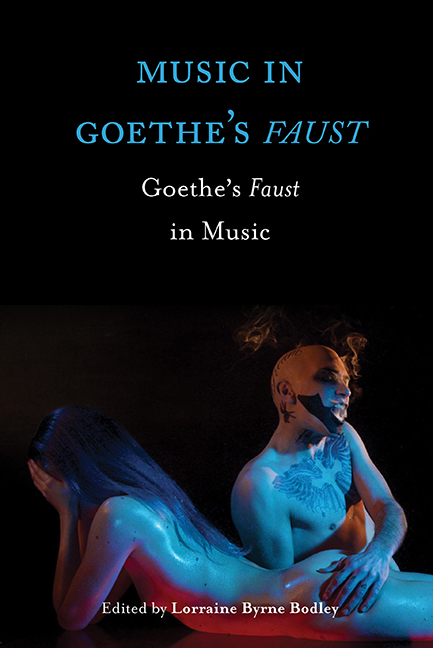Book contents
- Frontmatter
- Dedication
- Contents
- List of Illustrations
- Contributors
- Acknowledgements
- Abbreviations Used in the Notes
- Introduction. Rhapsody and Rebuke: Goethe's Faust in Music
- Part I Goethe's Faust: Content and Context
- Part II Legacies: Goethe's Faust in the Nineteenth Century
- Part III Topographies: Stagings and Critical Reception
- Part IV New Directions: Recent Productions and Appropriations
- Select Bibliography
- Index
Introduction. Rhapsody and Rebuke: Goethe's Faust in Music
Published online by Cambridge University Press: 30 August 2017
- Frontmatter
- Dedication
- Contents
- List of Illustrations
- Contributors
- Acknowledgements
- Abbreviations Used in the Notes
- Introduction. Rhapsody and Rebuke: Goethe's Faust in Music
- Part I Goethe's Faust: Content and Context
- Part II Legacies: Goethe's Faust in the Nineteenth Century
- Part III Topographies: Stagings and Critical Reception
- Part IV New Directions: Recent Productions and Appropriations
- Select Bibliography
- Index
Summary
The Faust myth has been deeply engrained in the collective European consciousness since the early Middle Ages and has invited widely different interpretations. Hundreds of literary images of the Faust myth exist, from Christopher Marlowe (1564–1593) to Gotthold Lessing (1729–91), from Johann Wolfgang von Goethe (1749–1832) to Thomas Mann (1875–1955), from Paul Valéry (1871–1945) to Michel Butor (1926–2016), all of which brilliantly illuminate the personal and cultural codes of the artists. From Anton Radziwill (1775–1833) to Conradin Kreutzer (1780–1849), from Franz Schubert (1797–1828) to Robert Schumann (1810–56), from Carl Loewe (1796–1869) to Hugo Wolf (1860–1903), from Hector Berlioz (1803–69) to Guiseppe Verdi (1813–1901), from Franz Liszt (1811–86) to Gustav Mahler (1806–1911), from Charles Gounod (1818–93) to Henri Pousseur (1929–2009): their retelling of the Faust myth always involves personal choices, variations of a theme that the composer chooses based on his or her circumstances. Part of the reality of these readings is the way the myth becomes charged with new meanings and absorbs new interpretations that open it up to new dimensions of reality yet to be discovered or re-explored. So why has the Faust figure been so persistent in music history? What do we know about Goethe's analogue to the Faust tale? Why was he preoccupied with it over a period of sixty years? What ethics inspired it? What elements in his handling of the myth inspired its long musical history? What is the modern meaning of this mythical tale?
The motif of a ‘pact’ with the devil, which Goethe's Faust drama explores, can be traced back to the Early Middle Ages, when the myth emerged as a moral parable aimed to demonstrate a Christian's constant danger of being tempted off the path of moral righteousness and adherence to divine command, and his susceptibility to seek power and reward from other sources. The trade between man and the devil would normally imply forfeiting eternal life for gratification in the temporal and material world and thus serve as a reminder that ambitions reaching beyond man's allocated place can be achieved only at a price.
- Type
- Chapter
- Information
- Music in Goethe's FaustGoethe's Faust in Music, pp. 1 - 20Publisher: Boydell & BrewerPrint publication year: 2017

